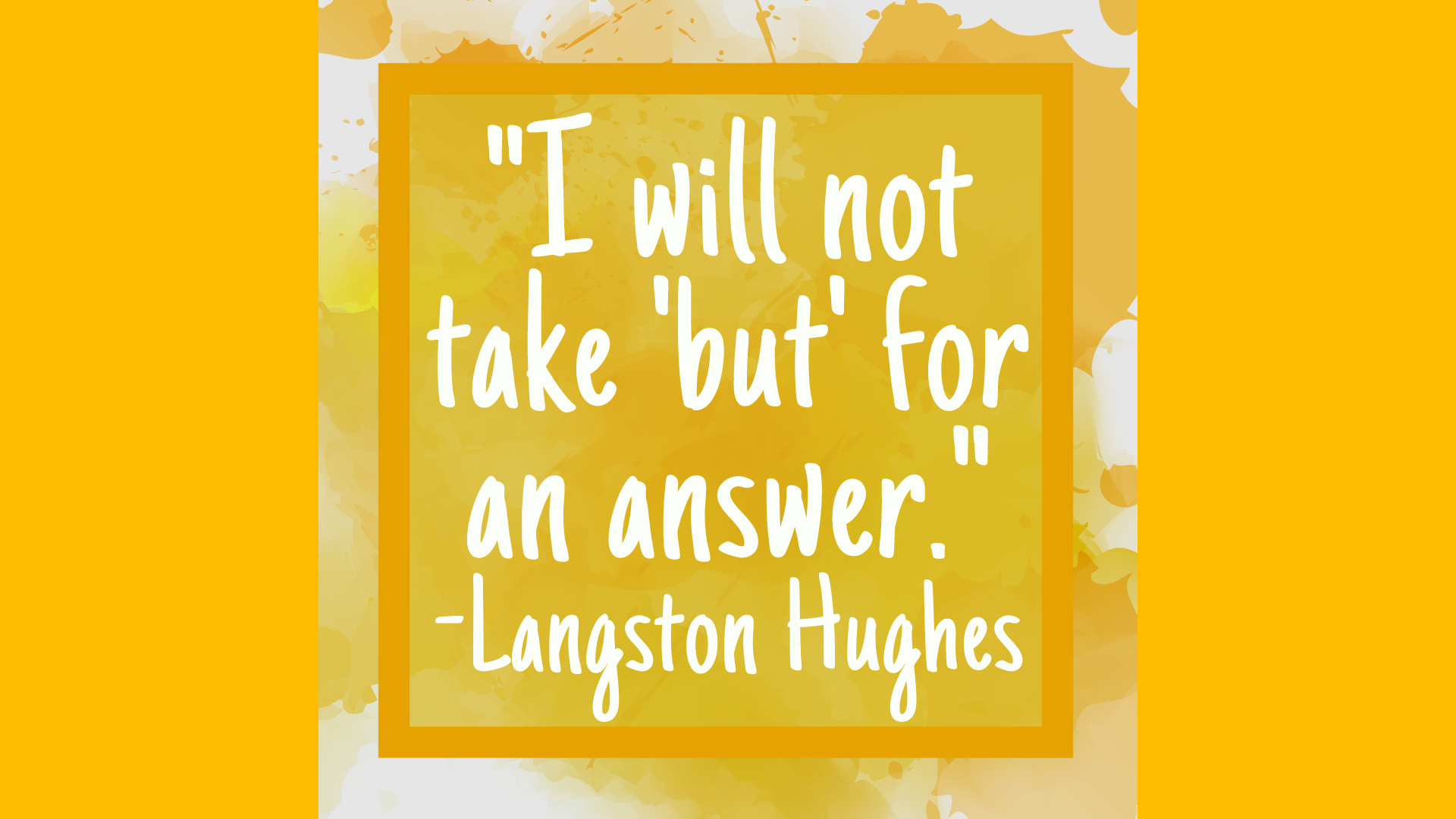Kay:
Hey-yo Questers, we hope you’re having a terrific Tuesday so far! It’s February 9th, and this is episode 287. We have such a fun quote for you today by the one and only Langston Hughes. Langston tells us, “I will not take ‘but’ for an answer.”

Shi:
Well, not only is this a clever quote but it’s also great advice. “I will not take ‘but’ for an answer,” because what we all know is when the but shows up in the sentence, it pretty much negates everything that came before it, which means that that is the real answer that you’re getting from moving forward. So, Langston telling us here, don’t take but for an answer, it’s just another clever way of saying, look out for those buts and find ways to get to the answers that you are looking for.
Kay:
Take this, for example, you look great in those jeans, but…
Kay & Shi:
Uh.
Kay:
Well, if I were to put the ‘but’ there you automatically know…
Shi:
I really want to do it but…(automatically know!)
Kay:
Yeah, right. Whatever comes after that is going to be in contradiction to what you just said. So, the word “but” is so popular in our society and it’s so sneaky because of its popularity we might not realize how it could be putting a cap on our energy toward a project or an idea or even a person.
Shi:
But it’s really a stopping point and it forces us to dichotomize our ideas and our thoughts. It’s either/or, it’s one or the other, it’s mutually exclusive. But pretty much… Do you hear that? But pretty much nine times out of 10, what Kay and I have found is that you can easily replace the word, but with the word and, and you can make your ideas and thoughts flow so much better. You can inspire creativity and you can ultimately get to that answer like Langston Hughes tells us without going through Buts-Ville.
Kay:
Yeah. Now Buts-Ville can be one of those sneaky, sneaky, almost I want to call it a dream killer if we will.
Shi:
Yeah.
Kay:
Because it can come into your life and you could find yourself saying something like, I really want to go after that dream, but my anxiety is just too high. Well, if we were to change out the word but for the word and in that sentence you could say something like, “well, I really want to go out for my dream and I have really high anxiety.” Now, you’re not saying I can’t go for my dream because of my anxiety. You’re saying I am going for my dream and I’ve also got anxiety. Guess what gang? Shila and I are not mentally perfect too. We also deal with doubts and fears and anxiousness and difficulties and anger spells and everything that everybody else does and we still move forward, and we still work every day and we still do our best to stay optimistic and to be grateful for what we’ve got.
Shi:
Well, as you just pointed out “but” is limiting your options when you do that. I really want that dream job, but I have anxiety. That just stops your mind, your subconscious, God, the forces that to be able to deliver you some kind of answer or solution, which is what we’re trying to get out with this quote here, and really tells us that there’s no reason that we can’t. But as you heard in the example, I really want to go after that dream job, and I have anxiety. That allows your brain to try and answer that question or to ponder that query or to think of a way that those two things can co-exist rather than just giving the but answer and killing the dream.
Kay:
Now, changing “but” in your own inner self-talk into “and” will definitely open up and widen your options. But swapping out “but” for “and,” and other little conjunctions as well in conversations with people that you love or even in the workplace can be incredibly beneficial. I mean, think about giving feedback to another person who you work with. You have to say something difficult. Now, if you say I liked that PowerPoint, but it really doesn’t have a lot of substance to it. Now, the “I like the PowerPoint is completely,” negated. The ‘but’ of it doesn’t really have any substance is the only thing the person can hear. Now, if you were to say, I really like the design of the PowerPoint, and I think it could use a little more substance that is a completely different message. Well, it’s the same exact message but it’s a completely different delivery that’s a lot more palatable to the person receiving the message.
Shi:
It helps control that meaning and really manage the message in a way that is conducive to the desires that you have. Before we started recording, we were talking about, “I really want to do this, but I have some hesitations,” and changing that allows the other person to maybe present something. I really want to do this, and I have some hesitations. You can see that those actually do go together and allow for some lively conversation or maybe moving something forward. Now, if it’s something like, “I really want to do that, but I don’t have the resources,” we suggest that you combine and with yet. I really want to do that and yet I don’t have the resources. So, you don’t even necessarily have to negate even when your outcome is to negate, but find a way to bring it so that there is validation for both parties. That’s really one of the best answers and solutions of all which is what Langston Hughes tells us here, “I will not take ‘but’ for an answer.”
Kay:
Alrighty, gang, you know, you got a But Quest coming at you today.
Shi:
But, but!
Kay:
Today we want you to count your buts. When you say “but” make a mental marker and by the end of the day tally them up. Bring a little awareness to your life and see what you can unfold. Are you ready?
Kay & Shi:
Let’s quest!




